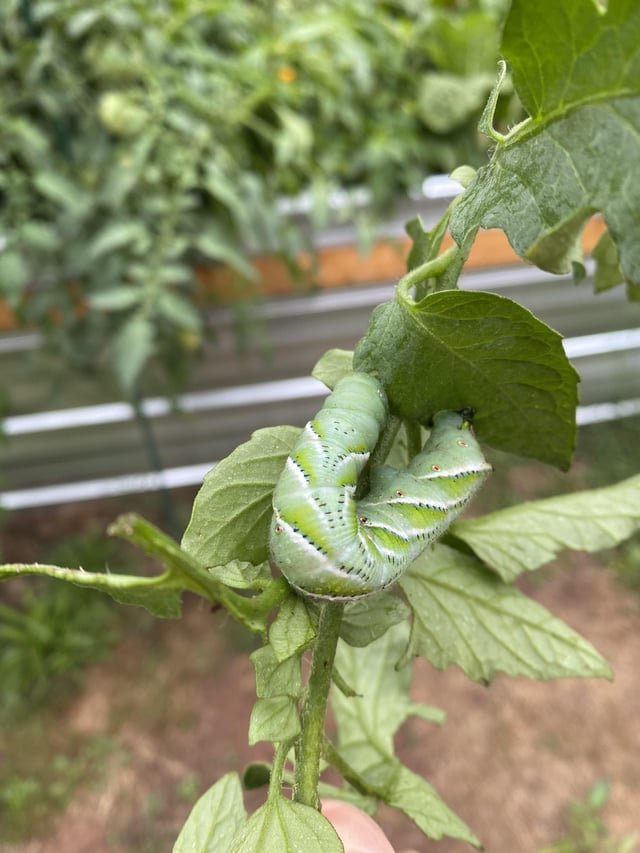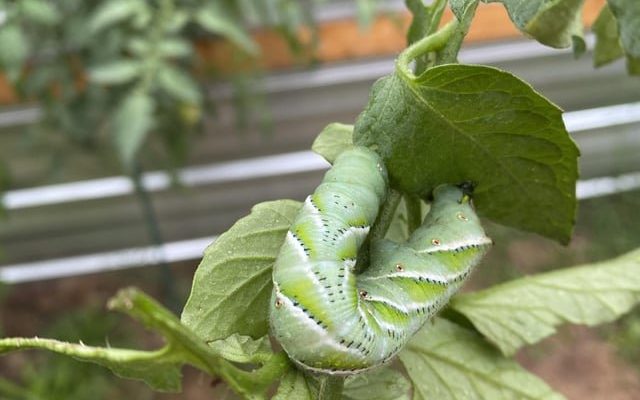
Hornworms are the larvae of the hawk moth, and these guys can quickly turn into a gardener’s worst nightmare. Imagine waking up one morning to find your tomato plants looking like they went through a blender. But don’t worry; understanding hornworms can help you manage them effectively in your container garden. In this article, we’ll explore what hornworms are, how they affect your plants, and some practical tips to keep your container garden flourishing.
What Are Hornworms?
Hornworms are large, green caterpillars that can grow up to 4 inches long, making them quite the sight to behold—and not always in a good way. They’re known primarily for their voracious appetites and can munch through leaves, stems, and even fruits faster than you might expect. Generally, there are two main types of hornworms to be concerned with in gardens: the *tomato hornworm* and the *tobacco hornworm*. Both of these pests are particularly fond of nightshades, with the tomato hornworm having a slight preference for tomatoes, while the tobacco hornworm will go for a broader range of plants.
You might be wondering why they’re called hornworms. Well, if you look closely, you’ll notice a distinctive horn-like projection on their rear end, which makes them easily identifiable. But don’t let that horn fool you; despite their somewhat intimidating appearance, they’re just hungry little guys trying to grow up and become beautiful moths. Here’s an interesting fact: hornworms can consume an incredible amount of foliage—up to 4.5 square feet of leaves in a single week!
How Hornworms Affect Container Gardens
Now that you know what hornworms are, let’s dive into how they can wreak havoc in your container garden. Picture this: you’ve nurtured your plants with love and care, watering them and ensuring they get enough sunlight. Suddenly, you notice that your beloved tomatoes are looking a bit worse for wear. Leaves are missing, and there are signs of nibbling on the stems. Yikes! That’s often a warning sign of hornworms.
Hornworms can cause significant damage by stripping plants of their foliage, which is crucial for photosynthesis. Without enough leaves, your plants can weaken, leading to stunted growth or even death. Plus, if left unchecked, a small population of hornworms can quickly turn into a larger infestation, leading to even more significant problems. If you’re growing food in a container garden, that can mean lost harvests—definitely not what you want after putting in all that effort!
Identifying Hornworm Infestations
Catching a hornworm infestation early is key to minimizing damage to your container plants. But how do you spot these sneaky little pests? First, you’ll want to keep an eye out for the actual worms. Despite being stealthy, hornworms can be surprisingly visible as they munch through leaves. To help you identify them, here are some tips:
- Look for droppings: Hornworms leave behind small, dark green droppings that you can often find beneath the plants they’re munching on.
- Check for damage: Besides missing leaves, you might notice parts of the stem look chewed or wilted.
- Look for the telltale horn: If you see a green caterpillar with a prominent horn on its rear end, you’ve found a hornworm!
Once you spot a hornworm, inspecting your plants regularly can help prevent a larger infestation. Remember, these pests are nocturnal, so you may have better luck checking your plants in the early morning or late evening.
Natural Ways to Control Hornworm Populations
Fighting hornworms doesn’t always mean reaching for harsh chemicals. There are several natural methods you can employ to keep them at bay in your container garden. Here are some effective strategies:
1. **Handpicking**: This may sound a bit gross, but sometimes the best way to deal with hornworms is to grab a pair of gloves and pick them off your plants. You can drop them into a bucket of soapy water to dispose of them.
2. **Beneficial insects**: Introducing predatory insects like wasps can be helpful. The braconid wasp, for example, lays its eggs in hornworms, leading to the hornworm’s demise. It’s a natural way to keep the balance in your garden.
3. **Neem oil**: This natural pesticide can disrupt the life cycle of hornworms when sprayed on affected plants. Just be sure to follow the instructions on the label to ensure you’re using it correctly.
Let’s be real—dealing with hornworms can feel overwhelming. But with these natural methods, you can tackle the problem without resorting to harmful chemicals, keeping both your plants and the environment safe.
Preventing Hornworm Infestations
Prevention is definitely better than cure when it comes to hornworms. Here are a few strategies to help you keep your container garden hornworm-free:
– **Rotate crops**: If you can, avoid planting the same type of plants in the same container every year. Crop rotation can help break the life cycle of the hornworm.
– **Maintain healthy plants**: Strong, healthy plants are more resilient to pests. Regular feeding, watering, and caring for your plants can help them stay vigorous and less inviting to hornworms.
– **Companion planting**: Some plants can help deter hornworms. For example, planting marigolds near your tomatoes can reduce pest problems thanks to their strong scent.
Overall, a proactive approach will go a long way in protecting your beloved plants from hornworms.
Recognizing When to Call for Help
Sometimes, no matter how much you try, pest issues can get out of hand. If you find yourself overwhelmed or dealing with a significant infestation of hornworms, there’s no shame in reaching out for help. Local garden centers often offer advice, while many communities have agricultural extension services that provide pest management assistance.
You might also consider reaching out to gardening groups online. There are countless forums and social media communities where fellow gardeners share their experiences and solutions. One person’s problem could be the key to your own!
In the end, whether you tackle it on your own or seek help, remember that every gardener faces challenges. Learning about pests like hornworms is just part of the journey.
Hornworms might seem daunting, but with the right knowledge and strategies, you can manage these pests and enjoy a thriving container garden. By staying vigilant, utilizing natural control methods, and understanding how to prevent infestations, you’ll protect your plants and ensure a bountiful harvest.
So next time you’re out in your garden, take a moment to appreciate not just your plants but also your growing knowledge as a gardener. Remember, every challenge—like dealing with hornworms—can be an opportunity to learn and improve. Happy gardening!

